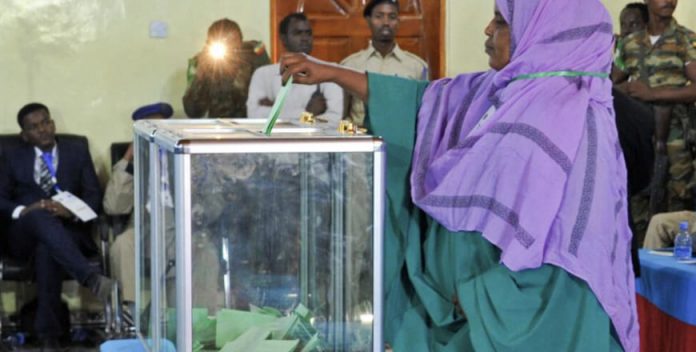The Somali government and federal member states revealed on Sunday their plans to implement direct universal suffrage, with local elections scheduled for June 2024.
This significant decision follows President Hassan Sheikh Mohamud’s commitment in March to replace the complex indirect electoral system that has been in place since 1969.
According to the government, the goal is to establish a democratic and corruption-free election process that promotes a multiparty political system.
“The election of the Federal Somali Republic must be one that gives the public the opportunity to cast their votes democratically in a one-person, one-vote system,” stated the government after reaching an agreement with state leaders.
President Mohamud expressed his support for the reform during a press conference, emphasizing the importance of returning decision-making power to the people.
He highlighted the need to move away from fear and towards a democratic election, stating, “We need to move out of the fear we are trapped in for 20 to 30 years and move to having a democratic election in this country: a one-person, one-vote election for both federal and federal member states levels.”
Somalia has been grappling with decades of conflict, insurgency, and natural disasters, including a severe drought that has resulted in widespread hunger.
The country has not held nationwide one-person, one-vote elections since 1969 when dictator Siad Barre seized power.
Instead, political dynamics have been based on clan affiliations, with key positions distributed among influential groups.
Clan delegates and state legislatures have been responsible for selecting lawmakers for the national parliament, who then choose the president.
The introduction of direct universal suffrage is seen as a step forward by many, including Abdulkadir Abdirahman Yusuf, a future voter who expressed optimism about the political agreement.
Previous elections by universal suffrage were successfully held in the semi-autonomous state of Puntland and in Somaliland, a self-declared independent region.
These experiences have been praised and seen as influential in expanding democracy across Somalia.
The agreement for nationwide universal suffrage was achieved after four days of meetings involving the National Consultative Forum, which included President Mohamud, Prime Minister Hamza Abdi Barre, and federal state leaders. However, Puntland’s state president, Said Abdullahi Deni, did not attend the gathering.
The agreement also proposes the adoption of a single presidential ticket, wherein voters would choose a president and vice-president, effectively eliminating the prime minister position.
The approval of this agreement by the parliament is still pending.
President Mohamud, who won a second term in May 2022, has pledged to address the country’s numerous challenges, including the threat posed by Al Shabaab terrorists, rising inflation, and the worsening drought that puts millions at risk of famine.
He envisions a bright future for Somalia, emphasizing that politics should be about organizing ideas and that clan politics is not relevant to the nation’s overall political landscape.











